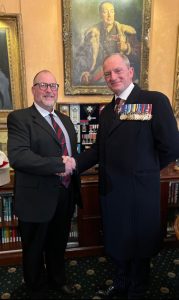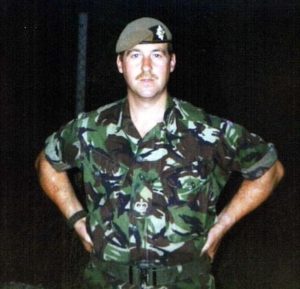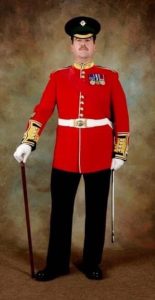An ambitious partnership project in Gloucestershire is helping thousands of veterans and serving members of the armed forces access the healthcare and support they need.
The NHS Gloucestershire Armed Forces Veterans Programme, which works with GP practice teams to determine what kind of help veterans might need, has been shortlisted in the Military and Civilian Health Partnership category of the 2024 Health Service Journal Awards.
By signing up to the Royal College of General Practitioners (RCGP) Accredited Veteran Friendly Practice scheme, GP practices are supported to increase their understanding of the health needs of veterans and the services available to them. They are able to appoint a clinical lead who is trained to act as a champion for issues relating to veteran healthcare.
Kevin Gannaway-Pitts, Armed Forces Veterans Representative and Senior Programme Manager for Digital Primary Care at NHS Gloucestershire has already encouraged 70% of practices to sign up to the scheme, with more practices currently in the process.
“It means a lot to find out the project has been shortlisted,” said Kevin.
It’s been a labour of love for me and to receive acknowledgement of the importance of the programme is overwhelming. Working together with practice teams means veterans will be able to access the right services and this can be a lifeline.”
The term ‘veterans’ includes anyone who has served in the Armed Forces (regular or reserve). Veterans are treated as a special group because they have put themselves in harm’s way to protect others, facing a much higher risk of series injury and sacrificing some of their own civil liberties.
Healthcare provided to armed forces personnel, veterans and their families includes preventive care, routine medical services, emergency care, rehabilitation, and mental health services. Gloucestershire is home to more than 8,000 veterans already registered at practices.
Kevin is working with practices to add a code for veterans on their personal health record, ensuring they are identified correctly when accessing healthcare. This means that information about the veteran’s GP health record is securely available to all health and social care partners in Gloucestershire. Their identity can also be shared through the summary care record, a national database that holds patient information.
Making sure Gloucestershire veterans are connected with local help via the Forces Connect app is a key part of the programme.
Kevin added: “We’re taking a whole partnership approach and giving people access to armed forces charities like Help for Heroes and SSAFA.”
Joining the Irish Guards in 1979, Kevin notched up 25 years of Army service. He explained:
“Veterans are treated as a special group because we are used to operating in a demanding environment. What we are subjected to is mentally and physically challenging and what you see on the cover is not always what’s in the book.”
Kevin, who lost close friends through various conflicts during his service, has been able to draw on his personal experiences (which include transitioning from a senior rank in the British Army) when mentoring forces personnel preparing for civilian life.
“The transition from the Armed Forces to civvy street is challenging and can have an impact on your mental and physical health and relationships,” he said.
“My work was stressful, particularly in Northern Ireland and later as part of the Kosovo war crimes investigation team following the occupation of Pristina in 1999.
Given the nature of our occupation, it’s no surprise that the rate of suicide, addiction and mental health problems is much higher for veterans. When you leave the forces you come out of a very structured environment. Suddenly you can feel you’re on your own without support, but this project acts as a buffer,” he added.
Kevin and the team are now awaiting judging for the Awards which takes place in October, with an awards ceremony scheduled for November.




